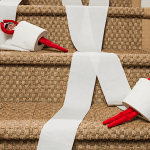Do You and Your Food Need Couple’s Counseling?
Do you have a more intimate relationship with your food than the people closest to you? Do you spend your time daydreaming about your next meal/ snack/ treat? When thoughts of consuming food consume your time, you may want to analyze your relationship with food. It just may be time to apply one of those bad Cosmo relationship quizzes to your eating habits. Yes, food is meant to be enjoyed and savored, anticipated and appreciated, even loved and adored. However, North Americans in general tend to take this gastronomic romance to extremes, becoming obsessive and stalkerish, dependent on and self-medicating with food. Forgetting that food is ultimately meant to nourish and fuel our bodies, to promote positive growth, cell repair and good health. Is it time for you to be a little more coy, maybe even play hard to get? Below are some tips to evolve your fatal attraction with food into a sense and sensibility romance.
1. Food Journaling – not just what and how much you eat daily but what time you eat and how you feel at that time (tired, bored, sad, angry etc). This will provide insight to your eating habits, many of which can be unconscious, mindless noshing.
2. Hunger vs. Thirst – many people misinterpret thirst signals as hunger so drink a large glass of water (not juice or soda) and wait before raiding the pantry.
3. Distract the Baby – if you tend to eat when you’re bored or tired distract yourself with something to keep you busy and get your mind off of food for at least 15 minutes. Try going for a walk, reading, pushups and jacks etc. Do something to get your mind off of thoughts of food and eating. If you still feel hungry than have a healthy snack (fruits, veggies or a handful of nuts).
4. You Are Not a Dog – don’t ever use food as a reward – for anything (this goes for your kids too). Rewards are great and important but you are not in obedience school. Treat yourself to something non-consumable like a shopping trip or spa treatment etc.
5. Meetings To Go – consider forms of active socialization. Grab a coffee and go for a walk with your friend, meet at the gym, play dates at the park or track, chatting while window shopping, gardening with a pal and so on.
6. Avoid the Rebound – severe food restrictions can lead to rebound eating and greater caloric intake. If you crave a cookie, then have A cookie (ONE), otherwise in your attempts to avoid ingesting this treat, you eat the entire contents of your kitchen in order to satiate a craving and dodge those “extra, bad” calories. Chances are you’ll consume much more “junk” and twice as many or more calories. The key, of course, is “everything in moderation”.




















